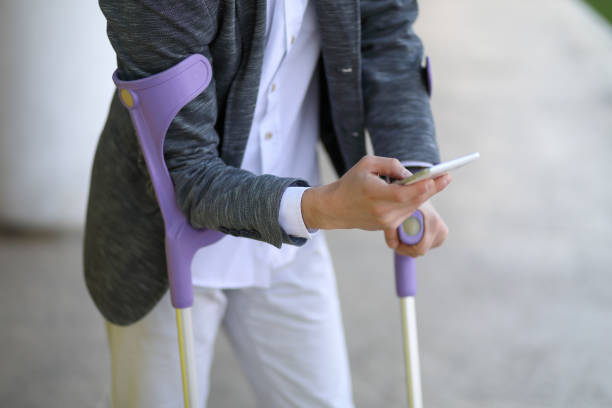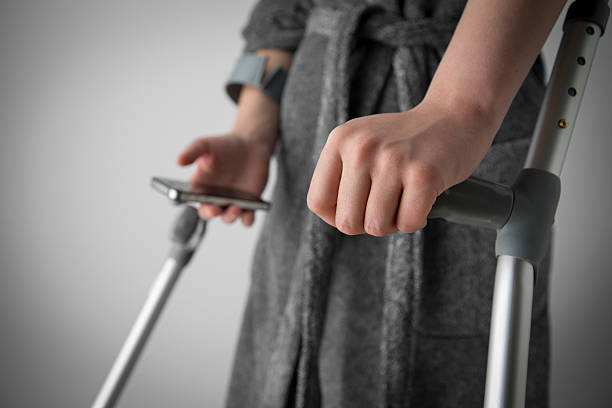Mobility aids like walking canes are crucial for individuals facing mobility challenges due to age, injury, or medical conditions. Many people rely on Medicaid services to cover the cost of durable medical equipment (DME), including walking canes. But does Medicaid cover them, and what are the requirements? This article provides an in-depth look at Medicaid coverage for walking canes, including eligibility criteria, costs, and how to obtain one.
Understanding Medicaid and Durable Medical Equipment (DME)

Medicaid is a joint federal government and state-funded health insurance program that provides healthcare services to low-income individuals and families. One of its critical benefits includes coverage for durable medical equipment (DME), which consists of medically necessary supplies like walkers, wheelchairs, hospital beds, and walking canes.
To qualify as durable medical equipment (DME) under Medicaid services, an item must:
- Be medically necessary.
- Be prescribed by a doctor or healthcare provider.
- Be suitable for home use.
- Provide general stability to the patient.
Since walking canes fall under the durable medical equipment benefit, Medicaid often covers walking canes when they meet these criteria.
Medicaid Coverage for Walking Canes
Medicaid covers walking canes under its durable medical equipment benefit when deemed medically necessary. However, the extent of coverage varies by state. Generally, Medicaid requires:
- A doctor’s prescription stating the medical necessity of the cane.
- The cane to be purchased from a Medicaid-approved supplier.
- The individual to be a Medicaid beneficiary.
Since Medicaid is a state-specific program, beneficiaries should check with their state’s official government organization to confirm specific coverage details.
Types of Walking Canes Covered by Medicaid

Medicaid covers walking canes that meet medical necessity requirements. Some of the common types of canes included are:
- Standard canes – Basic single-point canes for general stability.
- Quad canes – Canes with four rubber-tipped feet for increased balance.
- Offset canes – Designed for weight distribution to reduce strain on the wrist.
- Folding canes – Portable canes for easy transport.
- White canes – Used by visually impaired individuals (some states offer partial coverage).
Some states may also cover white canes or canes with additional features like built-in seats.
How to Obtain a Medicaid-Covered Walking Cane
If you need a walking cane, follow these steps to get it covered by Medicaid:
- Consult a doctor or healthcare professional – A doctor must confirm that a walking cane is medically necessary.
- Obtain a prescription – Medicaid requires a doctor’s prescription specifying the need for a cane.
- Find a Medicaid-approved supplier – You must purchase from a Medicaid-approved supplier.
- Billing Medicaid – Most suppliers will bill Medicaid directly, reducing your out-of-pocket expenses.
Checking with a Medicaid-approved supplier ensures that you receive the correct medical equipment without unexpected costs.
Costs and Copayments for Medicaid-Covered Walking Canes

Medicaid typically covers 80% of the approved cost of durable medical equipment (DME), including walking canes. However, there may be:
- A 20% copayment depending on the state.
- Possible deductibles or other cost-sharing requirements.
It’s essential to confirm full cost details with your state’s Medicaid office.
Medicare vs. Medicaid: Key Differences in Walking Cane Coverage
Does Medicare Cover a Walking Cane?
Medicare is different from Medicaid. While Medicare Part B covers durable medical equipment, including walking canes, there are specific conditions:
- Medicare-approved suppliers must provide the cane.
- The cane must be medically necessary.
- Medicare coverage may require out-of-pocket costs unless you have a Medicare Advantage Plan.
Medicare Advantage Plans sometimes offer better coverage for medical supplies, making them a good option for those eligible for Medicare.
Finding a Medicaid-Approved Supplier for Walking Canes
To locate a Medicaid-approved supplier, you can:
- Contact your state’s Medicaid program.
- Use a federal government website for supplier searches.
- Verify the supplier’s credentials and Medicaid approval status.
Some suppliers offer additional services, such as delivery and setup of medical equipment.
Tips for Getting a Medicaid-Covered Walking Cane
To ensure smooth processing of your Medicaid services, follow these guidelines:
- Always consult with a doctor before purchasing a walking cane.
- Ensure that the supplier is Medicaid-approved.
- Keep all documentation, including receipts, in case you need proof of purchase for Medicaid reimbursement.
Common Questions About Medicaid and Walking Canes
Can a Doctor Prescribe a Walking Cane?
Yes. A doctor or healthcare professional can prescribe a walking cane if it is deemed medically necessary.
Does Medicare Cover a Walking Cane?
Yes, Medicare Part B covers walking canes when prescribed by a doctor and purchased from a Medicare-approved supplier.
How to Get a Free Walker from Medicaid?
- Medicaid may cover walkers in addition to canes.
- The process is similar to obtaining a cane—consult your doctor, get a prescription, and use a Medicaid-approved supplier.
Are Canes Considered Medical Devices?
Yes, walking canes are classified as durable medical equipment (DME) and are considered medical devices when deemed medically necessary.
How Does Mobility Equipment Affect Insurance Coverage?
When it comes to mobility aids like walking canes, one critical factor to consider is how they affect insurance coverage. Different medical insurance plans, including Medicaid and Medicare, have specific rules about covering durable medical equipment (DME). The medical necessity of the equipment, the type of insurance plan you have, and whether you’re purchasing from an approved supplier all play roles in determining coverage. Always consult your provider to understand how a prescribed walking cane will affect insurance coverage.
Does Medicare Cover Walking Canes for Seniors?

A common question among older adults is, “Does Medicare cover walking canes?” Yes, Medicare Part B provides coverage for walking canes if they are prescribed by a doctor and deemed medically necessary. To ensure full coverage, beneficiaries must purchase the cane from a Medicare-approved supplier. Medicare coverage may also vary based on whether the person is enrolled in Original Medicare or a Medicare Advantage Plan.
Understanding How Medicare Cover Canes for Mobility Needs
Many people wonder, “How does Medicare cover canes?” Medicare Part B classifies canes as durable medical equipment (DME), which means they are covered when prescribed for a medical condition. Coverage typically includes standard canes, quad canes, and offset canes, provided they are medically necessary. Beneficiaries may have to cover part of the cost through deductibles or coinsurance, depending on their specific Medicare plan.
Medical Insurance and Coverage for Walking Canes
If you’re unsure whether your medical insurance covers walking canes, it’s essential to review your policy. Most medical insurance providers, including Medicaid and Medicare, cover durable medical equipment when prescribed by a healthcare professional. To qualify, the walking cane must be necessary to improve mobility due to illness or injury. Always confirm with your insurance provider to avoid unexpected out-of-pocket costs.
Does Medicare Cover Canes for Balance Issues?
Balance problems are a common reason people need walking canes, leading many to ask, “Does Medicare cover canes for balance support?” Yes, Medicare Part B covers canes if they are prescribed to help with mobility and balance issues. Your doctor must document the medical necessity, and you must purchase the cane from a Medicare-approved supplier. Costs may vary depending on your Medicare plan.
Choosing the Right Medicare Plan for Walking Cane Coverage
When selecting a Medicare plan, it’s important to consider how it covers durable medical equipment (DME) like walking canes. Both Original Medicare and Medicare Advantage Plans offer coverage, but the specifics differ. Medicare Advantage Plans may offer additional benefits, such as lower out-of-pocket costs or expanded coverage for specialty canes. Compare plans carefully to ensure you’re getting the best coverage for your mobility needs.
Why You Should Use Secure Websites When Purchasing Medical Equipment
When buying medical equipment like walking canes online, always ensure you’re using secure websites. This protects your personal information and ensures that you’re purchasing from legitimate, Medicare-approved suppliers. Look for website security indicators like “https://” in the URL and security badges. This is especially important if you’re billing Medicaid or Medicare directly, as you’ll be sharing sensitive health and insurance information.
Hospital Insurance vs. Medical Insurance: What Covers Walking Canes?
Many people confuse hospital insurance (Medicare Part A) with medical insurance (Medicare Part B) when it comes to covering mobility aids. Hospital insurance generally covers inpatient care, while medical insurance covers outpatient services and durable medical equipment, including walking canes. If you need a cane for home use, Medicare Part B will likely be the part of your plan that provides coverage.
Does Medicare Cover Preventive Services for Mobility Issues?
While Medicare offers many preventive services to help detect health issues early, coverage for mobility aids like walking canes falls under a different category. Preventive services may include screenings for conditions that affect mobility, but the cane itself is covered under the durable medical equipment (DME) benefit of Medicare Part B. Your doctor may recommend a cane after identifying mobility risks during a preventive health assessment.
The Importance of Secure Websites for Medicare Beneficiaries
For Medicare beneficiaries, purchasing medical equipment online requires caution. Using secure websites ensures that your sensitive personal and insurance information remains protected. This is especially important when dealing with Medicare-approved suppliers, as fraudulent sites can compromise your data or provide substandard equipment. Always verify the supplier’s credentials and ensure the website is encrypted before entering any personal details.
Frequently Asked Questions About Walking Canes and Insurance Coverage
Can a Doctor Prescribe a Walking Cane?
Yes, a doctor or a healthcare professional can prescribe a walking cane if it is deemed medically necessary. To qualify for coverage under Medicaid or Medicare, the prescription must clearly state the need for the cane based on the patient’s medical condition. This is especially important when applying for insurance coverage because both Medicaid and Medicare require documentation to prove the necessity of the durable medical equipment (DME). The prescription will also specify the type of walking cane needed, such as a standard cane, quad cane, or offset cane.
Does Medicare Cover a Walking Cane?
Yes, Medicare Part B covers walking canes as part of its durable medical equipment (DME) benefit. However, for the cane to be covered, it must be:
- Prescribed by a doctor or healthcare provider.
- Purchased from a Medicare-approved supplier.
- Deemed medically necessary for mobility assistance.
While Medicare generally covers 80% of the approved cost, the remaining 20% is often the patient’s responsibility unless additional coverage, such as a Medicare Advantage Plan, reduces out-of-pocket expenses. Always confirm the specific details of your Medicare plan to understand the exact coverage and potential costs.
How to Get a Free Walker from Medicaid?
To get a free walker from Medicaid, follow these steps:
- Consult Your Doctor: A doctor must determine that a walker is medically necessary for your condition.
- Get a Prescription: Obtain a written prescription from your healthcare provider.
- Contact a Medicaid-Approved Supplier: Purchase the walker from a Medicaid-approved supplier who can bill Medicaid directly.
- Verify Coverage: Coverage for walkers may vary by state, and some states might cover the full cost, while others may have minimal copayments or deductibles.
If you qualify for Medicaid, and the walker is medically necessary, you could receive it at no cost, depending on your state’s Medicaid services policies.
Are Canes Considered Medical Devices?
Yes, canes are classified as medical devices under the category of durable medical equipment (DME). This classification means that canes are designed for long-term use, are medically necessary for individuals with mobility challenges, and are suitable for home use. Both Medicare and Medicaid recognize walking canes as medical equipment, making them eligible for insurance coverage when prescribed by a healthcare professional. The type of cane—whether it’s a standard cane, quad cane, or offset cane—must meet certain criteria to qualify as medically necessary.
Conclusion
Medicaid covers walking canes as part of its durable medical equipment benefit, but the specific coverage details vary by state. If you need a walking cane, follow these steps:
- Consult a doctor for medical necessity.
- Obtain a prescription.
- Purchase from a Medicaid-approved supplier.





